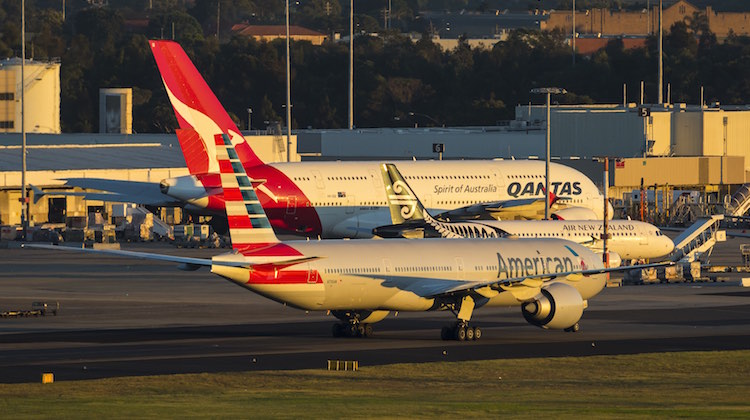Qantas and American Airlines plan to submit a new application to the United States Department of Transportation (DOT) for an expanded alliance on trans-Pacific routes in the next couple of months.
In November 2016, the two carriers withdrew their application for anti-trust immunity (ATI) after what they described as an “unprecedented” Show Cause Order that rejected the proposed tie-up.
However, it was hoped that a new administration at the DOT following the change of US president in January would come to a different decision.
Qantas international chief executive Gareth Evans says the two oneworld alliance members were still very keen to forge a closer working relationship.
“We do want to deepen that relationship in the way that we have talked about so we will be refiling the application in the next few months,” Evans told journalists on the sidelines of the International Air Transport Association (IATA) annual general meeting in Cancun, Mexico on Tuesday.
“We’ve had many conversations with the Department of Transport in Washington, both ourselves and American through this process so they are fully briefed.
“So we will go through that application again. My understanding is it’s going to take much less time this time through but we will have to wait and see once we reapply.”
The Hill: Qantas Airways ramps up lobbying ahead of joint venture bid https://t.co/a2uPTuUI0J
— Kelly Yamanouchi (@atlairportnews) April 4, 2017
Qantas and American have worked closely together on the trans-Pacific market, albeit without ATI. The pair started codesharing on each other’s flights in 1989 and helped establish the oneworld alliance as founding members.
American’s decision to start flights from Los Angeles to Sydney in December 2015 – and Los Angeles to Auckland in June 2016 – prompted the two carriers to seek ATI as part of an expanded joint business agreement to reflect the US carrier’s entry into the market with its own aircraft.
In February 2016, the Australian Competition and Consumer Commission (ACCC) authorised the JV for five years, while the New Zealand Ministry of Transport gave its approval in November 2015.
The ACCC decision meant that while Qantas and American were able to align pricing on tickets sold in Australia, the pair was not able to do so on outbound US fares without DOT anti-trust immunity.
The US end of the market has seen some extremely low fares in recent times as additional capacity from the likes of Qantas, American and United, as well as some currency changes that have affected demand and pushed down ticket prices.
More specifically, American fares for its own service to Sydney were regularly much lower than Qantas-operated flights, which put pressure on the financial performance of the Australian airline’s US operations.
Since the application was knocked back, Qantas has removed its QF airline code on American’s daily Boeing 777-300ER Sydney-Los Angeles service and tweaked frequent flyer arrangements between the pair, arguing some areas of cooperation were not viable without an immunised joint-venture alliance.
Meanwhile, American announced in April it would downgauge its Los Angeles-Sydney service from the 777-300ER to the 787-9 from November 2017, which represents a decrease of 25 seats a day on the route.
American is also reducing its Los Angeles-Auckland flights from year-round to seasonal, suspending the service for an eight-week period across August and October.
Qantas has maintained codesharing arrangements on American’s Auckland-Los Angeles service and on US domestic services.
“We are still working together very closely with American Airlines,” Evans said.
“We were obviously both very disappointed that the application got rejected.
“Our partnership and our relationship still remains strong and there is still a huge amount of traffic transfer between the two of us using the existing codeshare relationship.”
The other two major alliance groups on the trans-Pacific market are the Delta Air Lines-Virgin Australia tie-up and a JV between United and Air New Zealand.
















